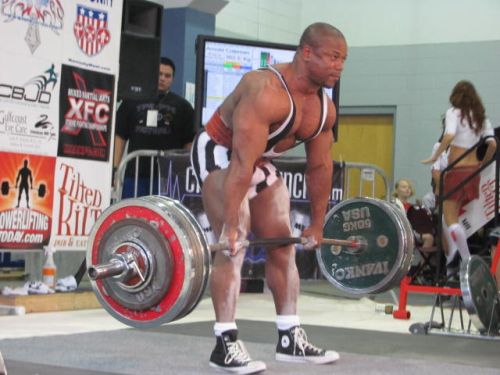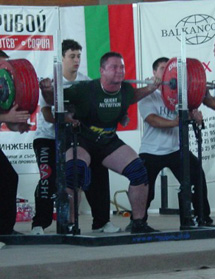Getting Over Overtraining -- 5 Realistic Tips
by Mike Tuchscherer

If you read interviews with top athletes, especially powerlifters and bodybuilders, a favorite question to ask them seems to be if they made any mistakes in their early training. And most of them will say that they spent too much time early in their careers overtraining. Many of these athletes feel that if they hadn't, they could have reached their current levels faster or maybe could have been even better than they already are.
Overtraining is a result of training stress, plus the rest of life's stress, exceeding an athlete's ability to recover. This results in stagnation, or even injury. At a minimum, it is inefficient - meaning that the athlete won't improve at their optimal rate.
If overtraining is so bad, and it's easy enough to fall into that even top athletes sometimes mess it up, what can you do about it? Well, I'm glad you asked! Below are five practical tips that you can use to prevent and/or treat overtraining. They are not in a particular order, nor are they all-inclusive. However, they are effective. So without further delay, let's jump right in.
Stress Management
Overtraining is an over-stress condition. This means that there is simply too much stress on the body. If you find yourself in an over-reached or overtrained state, take some additional measures to reduce the stress on your body. Some things will be beyond your control, but other things you can affect. Get to bed earlier, stop worrying about stuff, don't get into arguments with your spouse, etc. Not to mention reducing training stress. All stressors affect your body similarly - that is to say that they all require your body to expend energy to "fix" it. So if you are in an over-reached state, taking measures to avoid excess training stress is also a great idea, which brings me to my next tip.
Volume Control
When it comes time for reducing training stress, I like to start by reducing the volume. If you were to separate the roles of volume and intensity, most of your training effect will be determined by the intensity. Volume will determine the magnitude of that effect. If an athlete is having trouble recovering from training, I would start by reducing the volume of their training. This preserves the training effects intended by the program, but allows better recovery. It's kind of like turning down the volume on a stereo. It's the same music, just not as loud.
However, in more severe or chronic cases of overtraining, a more significant stress reduction may need to take place. It is at this point when reducing the intensity becomes necessary. Yes, this will change the Training Effects of the program, but if you're overtraining, you won't get any of those effects anyway.

Monitor your status
As the saying goes, an ounce of prevention is worth a pound of cure. The best way to prevent overtraining is to recognize the warning signs and react to them accordingly - before they get to be a problem.
Recognizing symptoms of overtraining has always been a difficult task for coaches and athletes. Most go by feel while others use any of several various tests as a barometer for overtraining. And if you're really lucky, you might have a much more complicated (and expensive) piece of equipment that can measure the status of various body systems.
Personally, I'm not a fan of "going by feel". I like to be a bit more objective with my training. And over time, I have found that "going by feel" can lead to inefficiency in training - something my athletes and I cannot afford to have. This is why we developed TRAC. TRAC stands for the Training Recovery Assessment Computer. This contains three tests that are performed first thing in the morning and they take about 10 minutes. The tests themselves may seem rather ordinary, but it is the specially developed methods of assessing those tests that really supercharges the TRAC system. It gives the user a report every morning that will tell you the status of your Bodily Stress, CNS functioning, Autonomic Nervous System (ANS) balance, as well as your adaptive reserves. TRAC is surprisingly accurate, requires no special equipment, and is very affordable. If you'd like more information on TRAC, please see the Team RTS section of my website at www.ReactiveTrainingSystems.com
However you choose to do it, monitor yourself for overtraining indications. If you see them starting to occur, don't just treat it with wishful thinking.
Passive Recovery
Passive recovery is another great way to improve recovery. Passive recovery methods (such as contrast showers, massage, etc) can work through a couple of mechanisms. They can affect the muscle itself by inducing additional bloodflow to bring in nutrients and remove metabolic byproducts. Passive methods can also affect you on a systemic level as well. In this sense, they help your entire body recover at a faster rate, in most cases by encouraging balance in the Autonomic Nervous System (ANS).
Crash course in the ANS: It is a part of the nervous system that controls automatic processes (hormones, digestion, heart rate, bloodflow, etc). The ANS is composed of two sides, Sympathetic (fight or flight) and Parasympathetic (rest and digest).
Without going into a large amount of detail regarding the ANS, suffice to say that we generally want our ANS to be balanced or slightly parasympathetic (unless we are getting ready for training or a competition). This is better for overall recovery. Overtraining often results in the ANS being shifted to the sympathetic side. If this is the case we want to choose passive recovery methods that promote the parasympathetic side. This helps bring our ANS back into balance and results in a faster recovery rate.
Some methods that can shift you back toward Parasympathetic are hot bathing / hot whirlpool for 15-20 minutes, relaxation massage, stretching, and even meditation. Although some of these methods are foreign to some, they do work.
A stipulation on that is that sometimes overtraining can push the ANS the opposite way and leave you parasympathetic dominant. In this case, you still show impaired recovery. The above methods won't help, either. This time you'll need to employ methods intended to strengthen the sympathetic side of the ANS. Some examples of these methods are contrast showers, hot-cold therapy, vigorous massage, and so on.
In general the first set of methods tends to be more relaxing while the second set of methods tends to be more invigorating. The key to knowing which set to use is knowing the state of your ANS. For some additional information on this, please refer to the above section on "Monitor your status".
Relax
The last tip is to simply relax. Most people miss this one because we get so caught up in always doing more. Not getting stronger? Do more work. Not recovering enough? Use more recovery methods. You get the picture.
But this isn't always the best or most efficient course of action. Sometimes the best thing to do is just relax a bit and take some time to do nothing training related. Now, remember, I said relax. I mean actually relax, not watch TV or play video games. Often, those two activities are used during the evening hours before bed. They are also stimulatory in nature, which can disrupt sleep patterns and also push that sympathetic imbalance I was talking about earlier. It is far better to spend some time in quiet conversation or reading to help prepare you for sleep. If that doesn't sound like your "thing", that's fine. Do what you want, but realize the decision you're making will affect your recovery and ultimately how you achieve your goals.
By now, you understand a little more about overtraining, how to avoid it, and what to do if it happens. If you put at least a few of these methods into practice, you're sure to improve your training efficiency, which will result in bigger gains over the long term. Thanks for reading!
Mike Tuchscherer is the owner of Reactive Training Systems, a company dedicated to individualized physical training. The goal of RTS is to help you become a dominant force in your sport! Learn more by visiting www.ReactiveTrainingSystems.com.
Mike himself is an accomplished Powerlifter. He has over 12 years of experience training and researching the best training methods in the world. Mike has competed in raw and single ply competitions. He recently won the Gold medal representing the USA at the 2009 World Games; becoming the first American male to ever win this distinction. His best lifts in IPF competition are a 903 squat, a 644 bench press, an 826 deadlift, and a 2342 total in the 275 pound weight class.
More Articles By Mike Tuchscherer
Return to the Workout Articles Archive
|